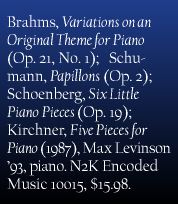Main Menu · Search ·Current Issue ·Contact ·Archives ·Centennial ·Letters to the Editor ·FAQs
| Books: Clinical Studies | Books: Harvard Homicide |
| Open Book: Why the French Are Polite | Music: The Well-tempered Performer |
| Off the Shelf | Chapter & Verse |


|
Max Levinson's artist diploma recital at the New England Conservatory in 1994 sent Boston Globe music critic Richard Dyer away waxing astronomical. Of Levinson's interpretation of the Liszt piano sonata ![]() Dyer wrote breathlessly, "[T]he music was as intimate as thought and as far-reaching as the cosmos."
Heaving breast aside, one can understand the tendency toward hyperbole: Levinson's playing--his bell-like tone, enveloping sound, and innate sense of musical drama--has all a young musician's vigor and the restraint of a much more seasoned performer. His first solo CD, released in June by N2K Recordings, offers a similarly flashy, utterly controlled performance.
Dyer wrote breathlessly, "[T]he music was as intimate as thought and as far-reaching as the cosmos."
Heaving breast aside, one can understand the tendency toward hyperbole: Levinson's playing--his bell-like tone, enveloping sound, and innate sense of musical drama--has all a young musician's vigor and the restraint of a much more seasoned performer. His first solo CD, released in June by N2K Recordings, offers a similarly flashy, utterly controlled performance.
Levinson's debut lines up some heavy hitters, including three pieces he played during his winning performance at the Dublin Piano Competition in May. He's selected early but important works by Schumann, Brahms, and Schoenberg, and a recent piece by Harvard professor emeritus Leon Kirchner. All the offerings on the CD are stereotypically Germanic, academic without being cold, expressive without being kitschy. Levinson's style of playing suits them perfectly.
At the outset of the Brahms, the first piece on the CD, Levinson is cautious to a fault, evident in his labored statement of the theme. (It sounds like someone speaking in loud, overly enunciated phrases.) But he soon relaxes, and his playing, though fluid, is never muddy. He extracts the guileless charm and good humor of Schumann's Papillons, and despite some flaws--a fitfully breathing rubato, for example--makes the piano actually sound more organ-like than percussive.

Levinson takes tempo more seriously in the Schoenberg, perhaps as acknowledgement that the piece begins the more difficult half of the CD for the average listener. He sounds slightly stiff. (It is a compliment to Levinson that it doesn't seem unfair to compare his version to Daniel Barenboim's more affecting interpretation.) The CD ends with Kirchner's Five Pieces for Piano, the only other available recording being Kirchner's own, on Nonesuch. Levinson plays the piece better than Kirchner, more articulately and coherently, and doesn't exhaust or bore with his dynamics despite the piece's fireworks.
Like many pianists, Levinson is somewhat of a ham. The first time I heard him, he performed a piece which began with an arpeggio played by the left hand, then taken up by the right, and ending with a note sustained by the right pinkie. He held the note for an absurdly long time and then, staring at the depressed key, rotated his hand in a balletic gesture, palm turning toward the ceiling, as if to waft the note heavenward. Though this was a near parody of pianistic affectation, it was also harmless, rehearsed showmanship--a tempered excess appealing in a musician of any age.
~ Daniel Delgado